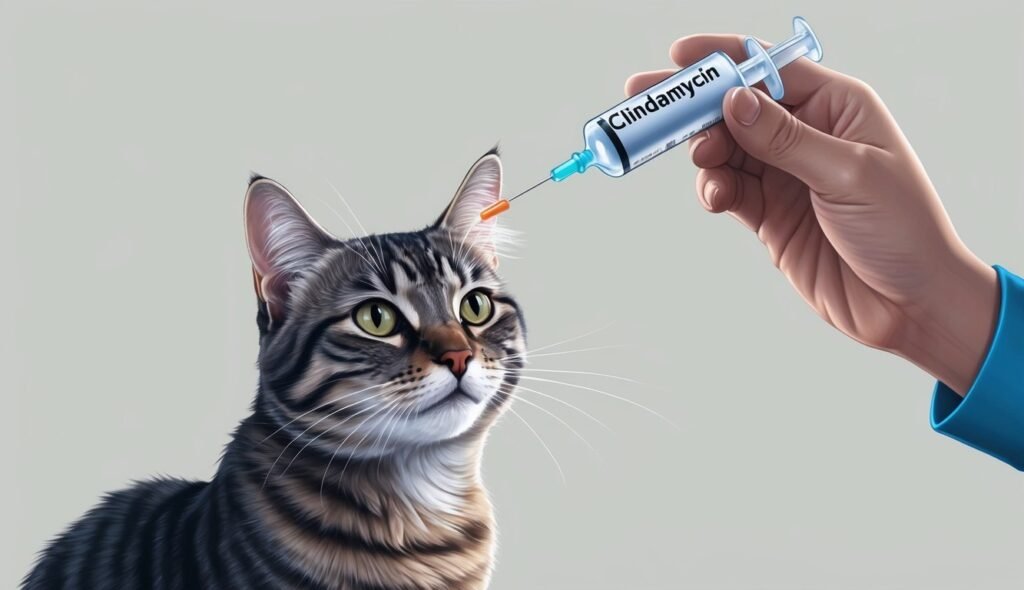Cats with feline immunodeficiency virus (FIV) can still lead fulfilling lives with the right care and management.
FIV primarily affects their immune system, making them more susceptible to infections.
With an estimated 2-3% of cats in North America living with this virus, it’s essential to know how to recognize the signs and what steps to take to ensure their health.
If your cat has been diagnosed with FIV, you may feel overwhelmed, but there are plenty of resources to help you navigate this journey.
From creating safe indoor environments to understanding dietary needs, managing an FIV-positive cat can be straightforward with the correct information.
With proper care, many cats with FIV can live for years without significant health issues.
As you explore this topic further, you’ll uncover tips for preventing transmission, health considerations specific to FIV, and answers to common questions.
Knowledge is your ally when it comes to caring for your FIV-positive cat.
Key Takeaways
- FIV primarily impacts a cat’s immune system, increasing vulnerability to infections.
- With proper care, FIV-positive cats can live long and healthy lives.
- Understanding symptoms and management is key to supporting your cat’s health.
Understanding FIV
Feline Immunodeficiency Virus (FIV) is critical for you to understand if you share your life with cats.
This section dives into the scientific aspects of FIV and how it compares to a virus humans encounter.
The Science of FIV
FIV is a lentivirus that primarily impacts a cat’s immune system.
When a cat is infected, the virus gradually destroys immune cells, particularly targeting T-helper cells, which are essential for fighting infections.
Over time, this leads to immune deficiency, making your cat more vulnerable to other diseases.
Cats may not show symptoms for years, but as the virus progresses, they might experience recurring infections or illnesses.
Antibodies can be produced in response, indicating exposure to the virus, but does not guarantee immunity.
Regular veterinary check-ups are essential for monitoring your cat’s health if they are FIV-positive.
Comparing FIV and HIV
FIV is often compared to Human Immunodeficiency Virus (HIV) due to their similarities.
Both are retroviruses that attack immune systems and can lead to deficiency diseases.
However, they primarily infect different species.
While HIV causes a significant health crisis in humans, FIV tends to affect cats without similar public health implications.
Additionally, FIV is mostly transmitted through bite wounds, while HIV spreads through bodily fluids like blood and unprotected sexual contact.
Understanding these differences can help you better care for your FIV-positive cat.
Diagnosis and Detection
Identifying Feline Immunodeficiency Virus (FIV) in cats involves specific blood tests and recognizing various clinical signs.
Here’s what you need to know to help detect this virus in your feline friend.
Blood Testing for FIV
The most common method for diagnosing FIV is through blood testing.
Two primary tests are available: the ELISA test and the Western blot test.
-
ELISA Test: This test detects antibodies to FIV in your cat’s blood. It is quick and can often be done in a vet’s office. A positive result usually indicates that your cat has been exposed to the virus.
-
Western Blot: If your cat tests positive on the ELISA test, a Western blot may be performed for confirmation. This test provides more detailed information about the virus, helping to rule out false positives.
-
Polymerase Chain Reaction (PCR): In certain cases, your vet may recommend a PCR test to detect the virus’s genetic material, especially if there’s ambiguity in other test results.
Testing should occur a minimum of 60 days after any potential exposure to ensure accurate results.
Clinical Signs of FIV
FIV can remain dormant in cats for years, making early detection crucial.
As the disease progresses, you may notice several clinical signs.
-
Fever: This can be a recurring sign and may not always be present.
-
Weight Loss: If your cat is losing weight despite a normal appetite, this could indicate immune system issues.
-
Gums and Teeth: Look for signs of gingivitis or stomatitis, which may indicate infection or inflammation.
-
Skin Infections: FIV-positive cats can develop persistent skin infections due to a weakened immune system.
Other signs to watch for include lethargy, behavioral changes, and increased susceptibility to other infections.
Monitoring your cat for these symptoms and consulting your vet promptly can ensure timely diagnosis and care.
Transmission and Prevention
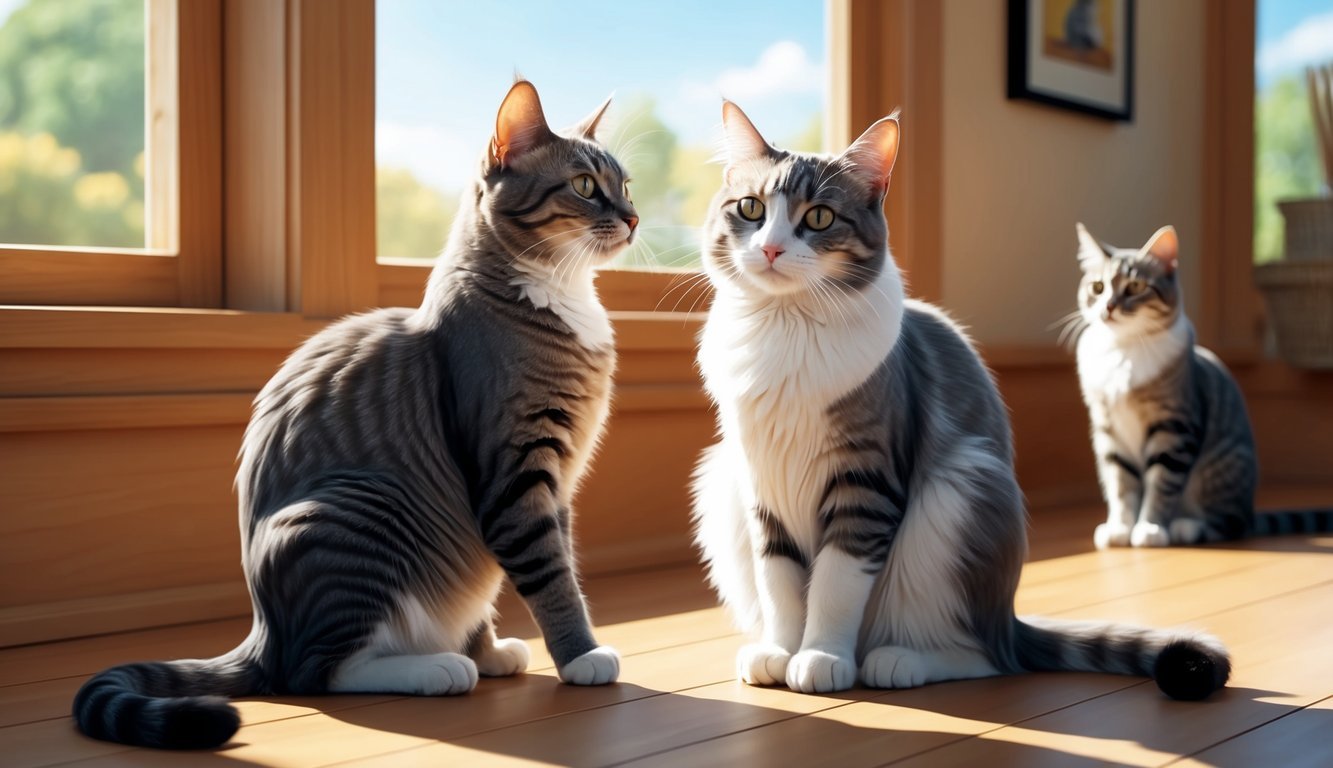
Understanding how Feline Immunodeficiency Virus (FIV) spreads is crucial for keeping your cat safe.
There are specific ways to minimize exposure and reduce transmission risks effectively.
How FIV Spreads Among Cats
FIV primarily spreads through bite wounds.
When an infected cat bites another cat, the virus in its saliva can enter the bloodstream of the other cat.
This is common in outdoor cats who may engage in fights over territory or mating rights.
Kittens can also get FIV through vertical transmission from their mother during birth or nursing, although this is less common.
It’s important to note that FIV cannot be transmitted through casual contact, such as sharing food or litter boxes.
If you have an intact male cat that roams outdoors, the risk of exposure to FIV increases significantly.
Neutering can help reduce aggressive behavior and minimize fighting, which lowers the chance of transmission.
Preventing FIV Transmission
To reduce the risk of FIV, keep your cat indoors as much as possible.
Indoor cats are less likely to encounter infected cats, which helps protect them from bites.
Creating a safe space for your cat, like a catio, can provide outdoor experiences without the risk of fights.
If you have multiple cats, consider implementing a vaccination program.
While the FIV vaccine is available, it’s not a substitute for other preventive measures.
Regularly neutering your male cats is also a proactive step.
Neutered cats show fewer aggressive behaviors, which can significantly decrease fighting incidents.
By focusing on these prevention strategies, you can help ensure a healthier and safer environment for your cat.
Treatment and Management
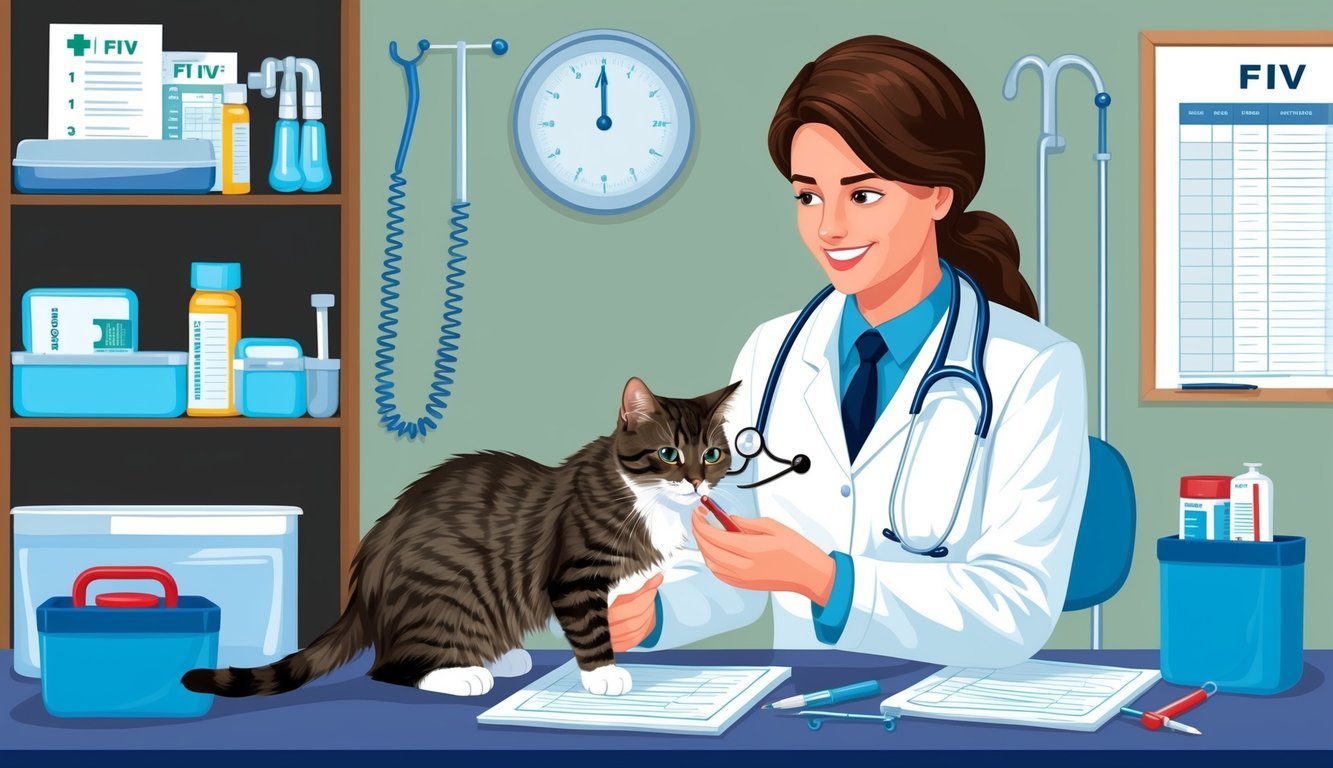
Managing a cat with Feline Immunodeficiency Virus (FIV) involves a combination of medical interventions and supportive care strategies.
Proper management can help maintain your cat’s quality of life and address potential complications.
Medical Interventions
Regular veterinary check-ups are essential for monitoring your cat’s health.
Your vet may recommend antiviral therapies, such as AZT, to manage the virus and improve immune function.
While no definitive cure exists for FIV, treating secondary infections is crucial.
These infections can arise due to the weakened immune system.
Be proactive about any signs of illness, as infected cats may take longer to respond to treatment.
Common treatments may include antibiotics for bacterial infections and medications for dental issues.
Your vet will provide a customized plan based on your cat’s unique needs.
Supportive Care Strategies
A balanced diet plays a vital role in supporting your cat’s immune system.
High-quality, nutrient-dense food can help them maintain strength.
Regular feeding schedules and fresh water availability are important.
In addition to diet, parasite control is necessary to prevent further health complications.
Keeping your cat strictly indoors may minimize exposure to potential infections.
Regular dental care is vital for preventing oral diseases that can lead to further health issues.
Always stay observant for any behavioral changes or signs of illness.
Prompt action ensures the best care for your feline friend.
Living with FIV
Living with an FIV-positive cat requires special considerations to ensure their health and happiness.
You’ll need to make informed decisions about adoption, lifestyle changes, and healthcare to create an enriching environment.
Adopting FIV-Positive Cats
When adopting an FIV-positive cat, it’s essential to understand their specific needs.
Many FIV-positive cats are friendly and can live harmoniously with other cats, especially if they are neutered males.
Before adoption, ensure that the cat is tested for other diseases, as FIV can make them more susceptible to infections.
It’s advisable to keep FIV-positive cats indoors.
This minimizes their exposure to potential infections from other animals and reduces the risk of spreading the virus to uninfected cats.
If you live with multiple cats, consider consulting a veterinarian to discuss safe introductions and housing strategies.
Life Expectancy and Quality
FIV-positive cats can lead fulfilling lives with proper care.
Their lifespan can vary, but many live into their teens.
Regular veterinary check-ups are vital for monitoring their health.
A balanced diet, stress reduction, and preventive care can greatly enhance their quality of life.
Investing in pet insurance may also be beneficial, as it can help cover medical expenses.
Keep an eye out for common issues like dental disease and upper respiratory infections, which they are more prone to.
Creating a stable, loving environment will support your FIV-positive cat’s needs and can lead to a happy companionship for years to come.
Health Considerations
Managing a cat with FIV involves being vigilant about potential health issues and ensuring regular veterinary care.
This attention can help mitigate risks associated with immunodeficiency and maintain a good quality of life for your feline friend.
Here are some critical health considerations to keep in mind.
Co-infections and Complications
Cats with FIV suffer from a weakened immune system, making them susceptible to various infectious diseases.
One common concern is the risk of co-infections with other viruses, such as feline leukemia virus (FeLV).
The combination of these diseases can lead to severe health complications, including deterioration of lymph nodes and neurological disorders.
In addition to viral infections, bacteria and parasites can cause further illnesses.
Regularly checking your cat for signs of parasites is essential, as even minor infections can escalate.
Pay attention to their appetite, weight, and energy levels.
Changes might indicate an underlying issue needing prompt attention from your veterinarian.
Monitoring and Regular Care
Routine veterinary visits are crucial for FIV-positive cats.
You should schedule examinations at least twice a year.
During these visits, your vet will perform blood tests to check your cat’s white blood cell count and assess their overall health.
These tests help monitor the immune system’s effectiveness.
Keep an eye out for symptoms like lethargy, fever, or changes in urination, which can indicate underlying problems, such as a urinary tract infection.
Regular vaccinations and parasite prevention are also vital in reducing the risk of illness.
Your proactive care and attention can significantly enhance your cat’s health and longevity.
FIV in Specific Cat Populations
Feline Immunodeficiency Virus (FIV) can affect various cat populations differently.
Understanding how FIV impacts kittens and unneutered male cats is crucial for proper management and care.
FIV in Kittens and Mother Cats
Kittens can be particularly vulnerable to infections at a young age.
A mother cat can transmit the virus to her kittens through her milk, especially during nursing.
Symptoms in infected kittens may not appear right away, which can mislead owners.
Common signs to watch for include lethargy, decreased appetite, and recurrent infections.
Many kittens can survive with FIV, but their immune systems might struggle more than those of healthy cats.
Early detection through testing and maintaining regular veterinary check-ups are essential to monitor their health.
Impact on Unneutered Male Cats
Unneutered male cats account for a significant percentage of FIV cases.
Their natural behaviors, including aggression and territorial disputes, increase the likelihood of transmission through bites.
These cats are often more prone to exhibiting symptoms such as weight loss, dental issues, and repeated infections.
Since they may roam outside more frequently, exposure to other infected cats is heightened.
Neutering can help reduce aggressive behaviors, thus lowering the risk of transmission.
Neutered male cats tend to have a lower prevalence of FIV due to more docile behaviors.
If you have an unneutered male, consider discussing the benefits of neutering with your veterinarian to promote better health.
Diet and Nutrition

Feeding a cat with FIV requires careful consideration of their dietary needs.
The right foods can help manage symptoms and support their immune system effectively.
This section will highlight recommended foods and potential supplements you might consider.
Recommended Foods for FIV Cats
When selecting food for your FIV-positive cat, focus on high-quality, nutritionally balanced options.
Cats are obligate carnivores, so protein is vital.
Look for meat-based proteins such as chicken or beef as the primary ingredients.
Key Recommendations:
- Limited Ingredient Diets: These diets can reduce the likelihood of digestive issues and allergies.
- Grain-Free Options: A grain-free formula may be beneficial, avoiding ingredients like wheat, corn, and soy.
- Raw Food: Some owners explore raw diets, ensuring they are nutritionally complete.
Pay attention to your cat’s appetite.
A lack of appetite or weight loss can signal that you need to adjust their food choices.
Supplements and Nutritional Support
In addition to a well-rounded diet, certain supplements can provide extra support for FIV cats.
Essential vitamins and minerals help bolster their immune system.
Consider adding:
- Vitamins A, E, and B complex: These are crucial for maintaining overall health.
- Omega-3 Fatty Acids: These can promote healthy skin and a shiny coat.
- Probiotics: Useful for maintaining gut health, especially if your cat has a sensitive stomach.
Avoid dairy products as many cats are lactose intolerant.
Monitor your cat’s reaction to any new supplement and consult your veterinarian for tailored advice.
Additional Tips and Considerations
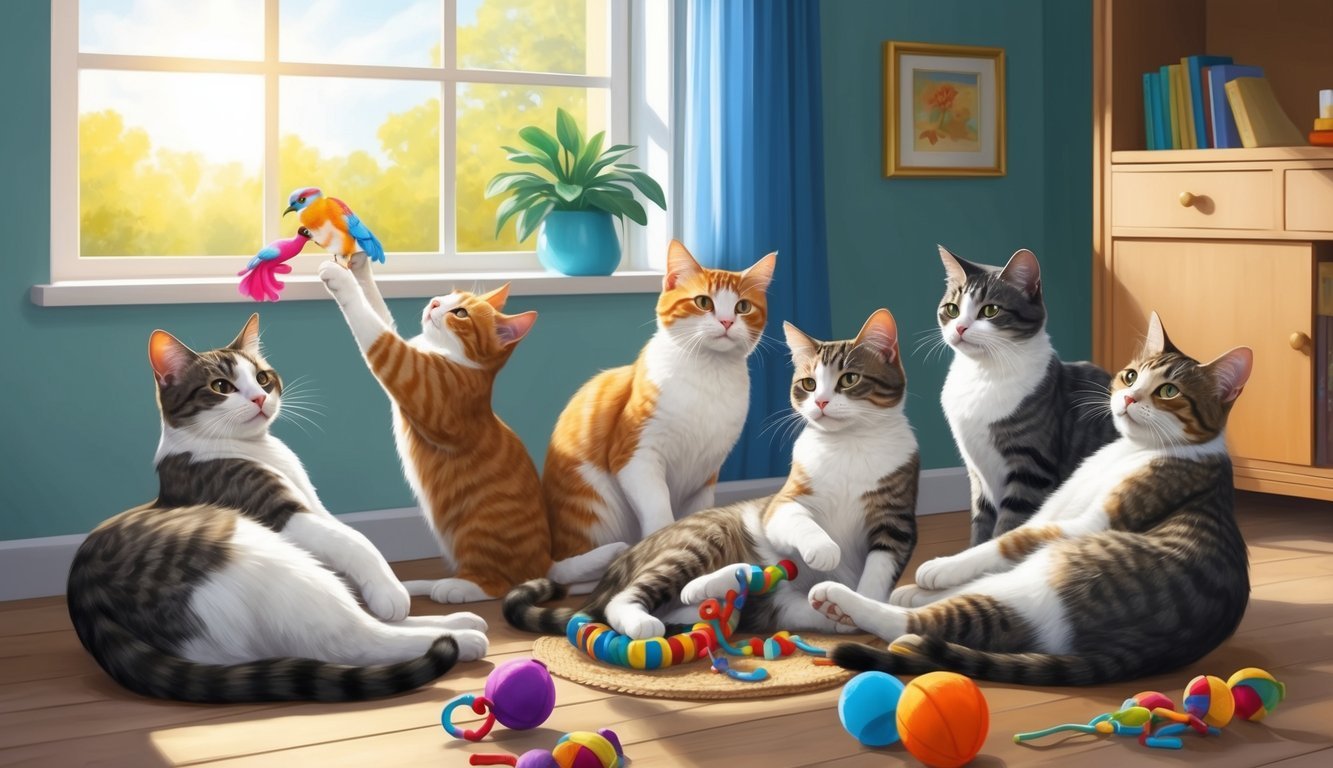
When caring for a cat with FIV, a few important considerations can help ensure their well-being.
Keep Your Cat Indoors
It’s best to keep your cat indoors.
This minimizes exposure to infectious diseases and protects their compromised immune system.
Consider Spaying or Neutering
Spaying or neutering your FIV-positive cat can reduce aggressive behavior and prevent transmission to other cats.
This is especially important for male cats who tend to roam.
Regular Veterinary Check-ups
Routine vet visits are crucial.
Regular check-ups help monitor your cat’s health and catch any potential issues early.
Parasite Control
Implement a robust parasite control routine.
FIV-positive cats are more susceptible to health issues from fleas, ticks, and worms.
Limit Stress
Create a calm living environment.
Stress can weaken your cat’s immune system, so try to minimize loud noises and sudden changes in their surroundings.
Socialization
Be cautious with new pets.
FIV is contagious to other cats, so introducing a new feline into the house should be done carefully.
Frequently Asked Questions
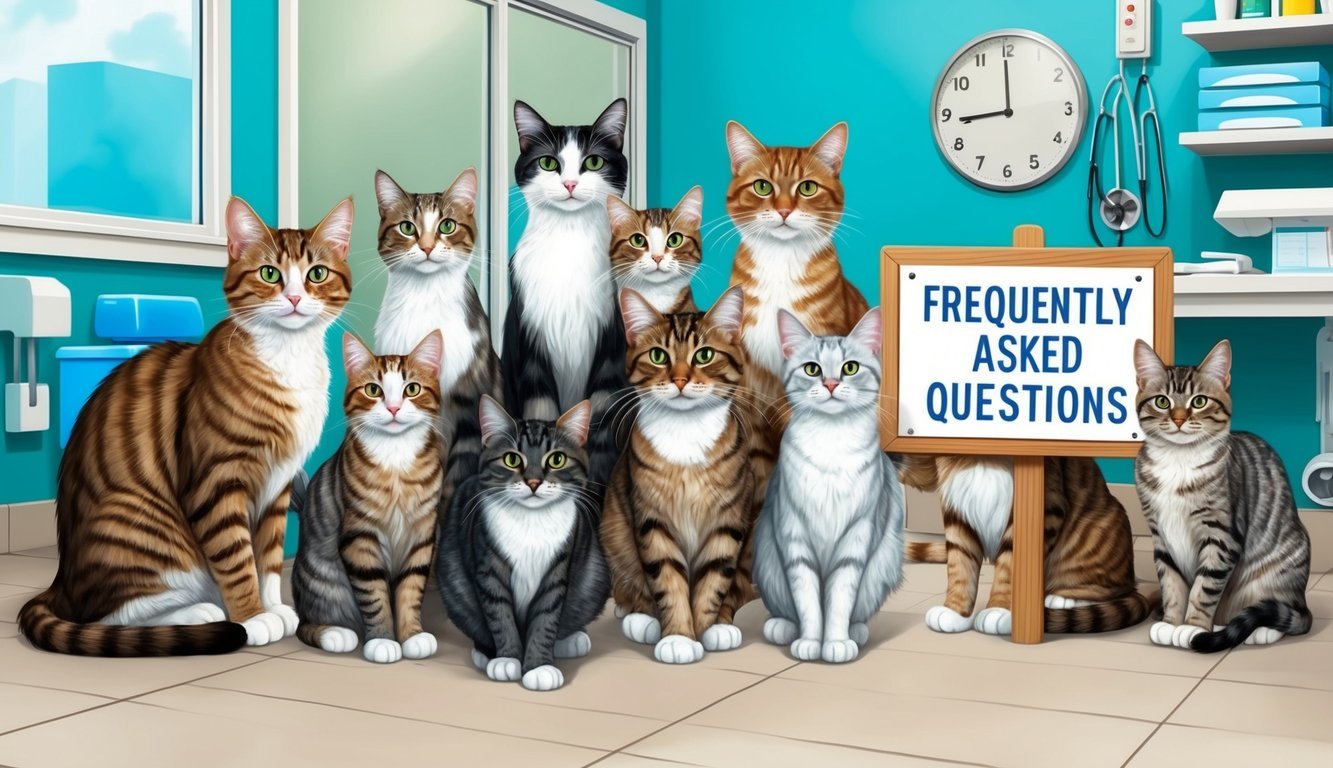
Caring for a cat with FIV brings many questions.
Understanding the signs, treatment options, and living arrangements can help you provide the best care possible for your feline friend.
What are the signs that a cat infected with FIV may display?
Cats with FIV can show a range of symptoms, though some may remain asymptomatic for years.
Common signs include weight loss, dental issues, skin infections, and recurrent respiratory problems.
Watch for changes in behavior, such as increased lethargy or loss of appetite.
How long can a cat diagnosed with FIV typically expect to live?
Cats diagnosed with FIV can live for many years, often reaching their normal life expectancy if well cared for.
Regular veterinary check-ups and a stable home environment are crucial.
Some infected cats may live symptom-free for a long time before developing complications.
What are the recommended treatments for a cat that tests positive for FIV?
There is no cure for FIV, but supportive care can help manage the symptoms.
This may include medication for infections, dental care, and nutritional support.
It’s essential to keep your cat stress-free and to monitor their health regularly.
Is FIV highly contagious among cats, and how does it spread?
FIV is not highly contagious between cats.
It primarily spreads through deep bite wounds during fights.
While transmission can occur via blood or from an infected mother to her kittens, it is rare for cats to contract FIV through casual contact like grooming or sharing food.
Can FIV-positive cats coexist safely with FIV-negative cats?
FIV-positive cats can live with FIV-negative cats, but precautions should be taken.
It’s best to keep them separated if possible, especially if the FIV-positive cat is aggressive.
If they coexist, monitor their interactions closely to ensure safety for all cats involved.
What should an owner do when caring for a cat that has FIV?
Caring for an FIV-positive cat includes regular veterinary visits and a healthy diet.
You should keep your cat indoors to reduce their exposure to infections.
Also, make sure your cat receives timely vaccinations and prompt treatment for any health issues that arise.



